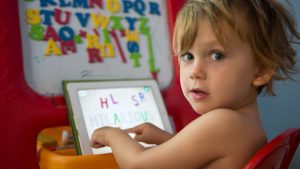How monolingual parents can raise a bilingual child
The issue of parents teaching their children comes up often and I've even had someone guest post on the blog about it before. That's great if you speak the languages yourself, but what if you are monolingual and still want to give your child the best possible head start in this wonderfully global world?
Christine, who blogs at AlmostFearless and who has been travelling with her husband since 2008, has thought long and hard about this while she raises her own son, and is even writing a book about the experience. If you want to help out, see details at the end of the post. Otherwise, enjoy her take on what parents can do to help their children learn languages that the parents themselves don't speak fluently yet!
Over to you Christine!

I need your help. Skip to the bottom to see, but first my story.
There was a profile of Ellen Bialystok in the NY Times a few years ago, and it came out just after my grandfather had died from dementia. In the article, Bialystok, a researcher who focuses on bilingualism talked about her discovery that bilinguals and trilinguals gained about 4-5 years before they started showing symptoms of memory loss from late-life diseases like Alzheimer’s.
This study stuck with me because my grandfather, a Finnish-English bilingual, had led a long healthy life, until he got dementia — but it only appeared in his last year. In fact he was at a condo in Florida outside of Palm Beach, that specific place because of the large Finnish population – they even have their own Finnish newspaper. It was through this strange bubble of Finnish speakers, both in Florida where he spent half the year, and in surrounding area around his home in Massachusetts, that allowed my grandfather to use both languages his entire life, decades after his immigrant parents died. Based on Bialystok’s research, being bilingual might have given him 4 extra years of good health.
Soon, with a child of my own, I knew I wanted to be bilingual, if not just for me, to satisfy this long flirted with but never achieved goal, but for my son, who was young enough to learn a second language easily, permanently changing how his brain works, and potentially staving off the effects of late life memory loss, someday far in the future.
All material seems focused on bilingual parents
The first thing I did was to read about a dozen books on raising bilingual children, but I noticed something I hadn’t expected… whether through design or market-demand, many of the books focused on how bilinguals could introduce a non-dominant language at home.
A Spanish speaker living in the US could speak Spanish with their child. If she married a German speaker, he could speak German. The child would learn English from the environment, Spanish from his mother, German from his father and boom you have trilingual child. Many of the books talked about some of what to expect from such arrangement, as it’s not always easy and even bilingual parents can struggle. But I felt entirely left out.
What about people who just spoke English? What about parents who lived in a monolingual culture?
I came away with three questions:
- How could two English monolinguals (like my husband and I) teach my child a second language?
- How many languages can your child learn?
- Would there be any benefit if the child learned a non-dominant language (like Mandarin) in a country that spoke something else altogether (like Spanish)?
My son is now approaching four years old, and I don’t have all or even most of the answers, but I have some ideas about teaching children languages in a monolingual home that I discovered over our travels to China (to learn Mandarin), Lebanon (to learn Arabic) and Mexico (to learn Spanish).
How can monolinguals teach their child a second language?

I feel from my own experience that the first place to start is to learn the language yourself. Unlike having your kid play the piano, or take dance lessons, learning a language does require to at least some extent active participation from the parents.
I can appreciate and encourage my child’s piano playing without knowing how to read a lick of music, but languages are all about communication. It’s not a requirement – I read one story about a child who learned three different local dialects from the gardener, nanny and cook in India – and his parents only spoke English.
But for most of us, we don’t have an entourage of foreign language speakers following us around. A cheap and affordable way to achieve this is to learn it yourself. You can help your child to practice by speaking with them in the language, and as they get older you will understand and engage when they begin to use these new words.
The second conclusion I came to was that my child would learn a little from foreign language media (like watching the popular cartoon Xi Yang Yang in China – he learned the intro song quite well before we left) but his language exploded when we spent time speaking with native speakers.
We tried different things in each country, in part because I wanted to test how things worked, and to be flexible and not commit too heavily to any one set of rules. Yet it was amazing how much he learned with his Chinese ayi verses what he picked up from Lebanese children on the playground for an hour a day. The focused one-on-one conversation with his ayi and her complete lack of English meant that he started introducing Mandarin words much more quickly than he did with Arabic.
At the end of the day, we all have different resources and it becomes a question of what are you able to do… if you can introduce native speakers into the child’s life that’s ideal (and if that’s you, consider yourself one of the lucky ones).
If you can learn the language and speak it to your child regularly, this works well too. If you do a combination of books, music, cartoons and other media in the target language that is good exposure but most likely not enough to achieve bilingualism, at least as you might define it as a native-like fluency.
Ultimately raising bilingual children for monolinguals, especially in a monolingual culture (like my home country, the USA), means having either friends/neighbors who speak that language, childcare in the language or a school system available to you to assist.
If those things aren’t an option, any parent can still learn the language first hand and routinely use it with their child. Even if you’re not perfect. I know because my Mandarin, Arabic and Spanish all need quite a bit of work before I'll consider myself fluent. Yet it still works and you will learn as they learn (believe me, nothing increases your vocabulary like an inquisitive toddler).
There are a lot of tools out there to help kids learn, and I think they are useful, but there needs to be at least one human in their life that speaks the language. That’s just my experience and recommendation but popping in foreign-language-dubbed movies is not going to be enough.
We even accidently tested this theory during the 4 months we spent in Lebanon where my son watched lots of French cartoons (he went through a big Garfield in French phase), but never produced a single French word because we didn’t reinforce his French by speaking it with him – we were there to learn Arabic.
How many languages can your children learn?

There’s a limit and it comes not from the number of languages but the depth of understanding and vocabulary.
My son has no problem learning English, Mandarin, Arabic and Spanish, but he’s just learning. A few words, a simple sentence, eventually he’ll speak them all at varying levels. Comprehension comes even faster than speaking.
But as adults, each of us have a lifetime of education in our native language, spending years learning the grammar, increasing our vocabulary and learning how to express ourselves in the written word. Let’s just take vocabulary for instance. I can teach my son the word in Spanish for moon, cat, or spoon, no problem. But depending on the education he receives, his language in the classroom is going to quickly outpace my ability to keep up.
Sure, I can figure out how to say “earthworm” for his biology class, but what about mathematics? Will I take the time (and will he let me) to explain quadratic formulas in three other languages? Will I do that for all his subjects, all the way through high school? Unlikely.
As a parent, I think it’s important to think about what language(s) you will want to focus on and what their use will be.
For us, we would like our son to be native-like fluent in Spanish and English. That means planning his education around this. We also want him to speak Mandarin and Arabic fluently (meaning with ease), and his early exposure will help him internalize those tricky Mandarin tones and the poetic sounds of spoken Arabic.
However, realistically in those two languages, while he will be conversationally fluent, his vocabulary will lag. He most likely won’t learn to write in Mandarin until he’s older if at all, he won’t get all the Arabic jokes kids tell each other because he won’t grow up in the Middle East. If he goes to university in one of those languages he will have to catch up to translate his specialized Spanish and English vocabulary into the new language. We’re okay with that.
We’re prioritizing his language learning around one thing: communication.
We’d like to give him the ability to speak with lots of different people around the world, but as time goes on and we experiment more with each language, it’s clear that there are always compromises to be made. While I could enroll him in Saturday Mandarin school, and Sunday Arabic class, I think speaking the language is enough, for our family and our goals, and maybe instead he can go play with his friends. There’s a balance in there somewhere that we are still figuring out, but as any parent knows, you can’t do it all.
Is there any benefit to learning a language that isn’t spoken in the country you live in?
I think there is. I’m not an academic so I won’t go into the research (there are many exciting studies going on about the benefits for children).
However, just from watching my son, I think learning any language and getting that exposure helps you understand your first language better. The first week we sent him to bilingual school he came home not just speaking more Spanish (of course we were thrilled at this) but also speaking more and better English.
He was actually getting less exposure in English than before, but suddenly he was using new English words, excitedly telling us about his day, switching between languages to tell us about his new “novia” and the rules at school, “no running!”.
There’s a lot more to be written about this, and I highly recommend reading François Grosjean’s book Bilingual: Life and Reality. It clears up some of the myths and misconceptions about raising bilingual children and being bilingual in general – and he’s a leading academic on the subject so everything he says is backed up with the latest research. (For example: childhood bilingualism doesn’t lead to speech delays etc.)
I’m writing my own book about my experiences, it will be published with Penguin/Random House (they recently merged) and while I’m not writing a how-to book, I am trying to collect as much information about how other people approach raising their children with multiple languages, how adults approach language learning and how academics who study this field approach language learning in their own lives or with their children if they have any.
If you are interested in participating, I have three surveys — just complete the one that applies to you. If you check “yes” for a follow up, I will be interviewing as many people as possible over the coming days and weeks – but that’s not required. Just tell me your story, I would love to hear about how you have learned and used languages in your life. (Edit: The surveys are now closed)
Survey for those who speak 4+ languages
Survey for parents of bilingual children
Survey for language teachers, academics and researchers
If you just want to follow my journey, I blog at almostfearless.com.



Social